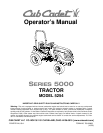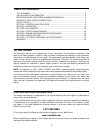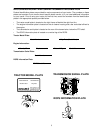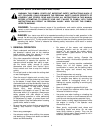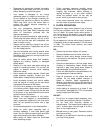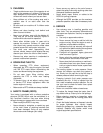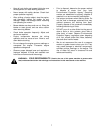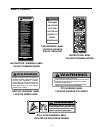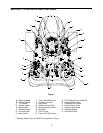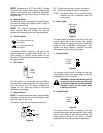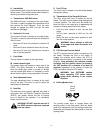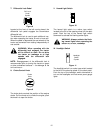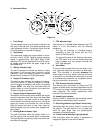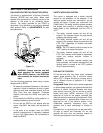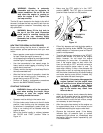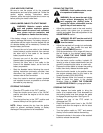5
• Disengage all attachment clutches, thoroughly
depress the brake pedal and shift into neutral
before attempting to start the engine.
• Your mower is designed to cut normal
residential grass of a height no more than 10”.
Do not attempt to mow through unusually tall,
dry grass (e.g. pasture) or piles of dry leaves.
Debris may build up on the mower deck or
contact the engine exhaust presenting a
potential fire hazard.
• Use only accessories approved for this
machine by Cub Cadet. Read, understand and
follow all instructions provided with the
approved accessory.
• Use the roll bar and seat belt for safe operation.
Overturning the tractor without a roll bar, or with
a roll bar and the seat belt unfastened, can
result in death or injury.
• Always use the seat belt, except if the roll bar
has been removed or, if applicable, the roll bar
is in the folded position.
• Use the handholds and running boards when
getting on and off the tractor to help prevent
accidental falls. Keep the running boards clear
of mud and debris.
• Keep all safety decals clean and readable.
Replace any missing, illegible, or damaged
safety decals.
• Always sit in the tractor seat when starting the
engine or operating controls. Do not start the
engine or operate controls while standing
beside the tractor.
• Never tamper with safety devices. Check their
proper operation regularly. Contact your Cub
Cadet dealer if safety devices malfunction.
• Avoid accidental contact with control pedals
while the engine is running, as this can cause
unexpected movement of the tractor.
• Pull only from a drawbar or the lower hitch links
in the down position. Make certain the drawbar
pin is locked in place. Pulling from the rear axle
of the tractor or any point above the axle could
cause the tractor to overturn.
• Maintain the weight balance of the tractor.
Install front end weights to counterbalance
heavy implements attached to the three point
hitch. Do not operate the tractor with a light
front end.
• Do not leave equipment in the raised position.
• Watch for traffic when operating near or
crossing roadways. If local laws permit road
travel, use the flashing hazard lights and SMV
signs when traveling on public roadways.
• Make certain all tractor lights are illuminated
when operating at night.
• Check overhead clearance carefully before
driving under power lines, wires, bridges or low
hanging tree branches, before entering or
leaving buildings, or in any other situation
where the operator and/or roll bar may be
struck, which could result in serious injury.
• If the tractor becomes stuck, use reverse to
free the tractor to prevent tractor upset.
2. SLOPE OPERATION
Slopes are a major factor related to loss of control
and tip-over accidents which can result in severe
injury or death. All slopes require extra caution. If
you cannot back up the slope or if you feel uneasy
on it, do not operate this unit on that area or serious
injury could result.
Do not operate on inclines with a slope in excess of
15 degrees (a rise of approximately 2-1/2 feet every
10 feet). The tractor could overturn and cause
serious injury
DO:
• Operate up and down slopes, not across.
• Remove obstacles such as rocks, limbs, etc.
• Watch for holes, ruts or bumps. Uneven terrain
could overturn the machine. Tall grass can hide
such obstacles.
• Place the transmission in the low range. when
climbing or descending slopes. Always keep
machine in gear when going down slopes to
take advantage of engine braking action.
• Follow the manufacturers recommendations for
counterweights to improve stability.
• Keep all movement on the slopes slow and
gradual. Do not make sudden changes in
speed or direction. Rapid engagement or
braking could cause the front of the machine to
lift and rapidly flip over backwards which could
cause serious injury.
• Avoid starting or stopping on a slope. If tires
lose traction, disengage the PTO and proceed
slowly straight down the slope.
DO NOT:
• Do not turn on slopes unless necessary; then,
turn slowly and gradually downhill, if possible.
• Do not mow near drop-offs, ditches or
embankments. The mower could suddenly turn
over if a wheel goes over the edge of a cliff or
ditch, or if an edge caves in.
• Do not mow on wet grass. Reduced traction
could cause sliding.
• Do not try to stabilize the machine by putting
your foot on the ground.



